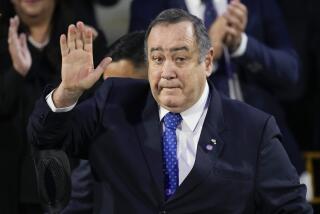Reagan, Bush Assure Delvalle: Panama’s Noriega Still Must Go
- Share via
WASHINGTON — Eric A. Delvalle, reportedly on the brink of resigning as Panama’s “president in exile,” met Thursday with President Reagan and President-elect George Bush, who gave him a pep talk and assured him that the United States stands firm in its resolve to oust strongman Manuel A. Noriega. However, they offered no new plans for accomplishing the task.
Instead, the two men sought to portray U.S. policy as effective and consistent as Reagan leaves office and Bush prepares to assume the presidency.
White House spokesman Marlin Fitzwater said that Delvalle, who met for 30 minutes with Secretary of State George P. Shultz on Wednesday, came to Washington because “he was looking for assurances of steadfastness in U.S. policy,” which recognizes Delvalle as Panama’s legitimate chief of state. Fitzwater added that the change in administrations has inspired “rumors and unfounded stories in Panama of a change in U.S. policy, and he wanted to be assured on those points, and he was.”
In the 15-minute White House meeting, Reagan “commended Delvalle for his personal courage and patriotism,” while Bush vowed that his policy “will be that Noriega must go,” Fitzwater reported.
U.S. Backing Voiced
Fitzwater said that there was “no discussion at all” of a possible Delvalle resignation and that “he didn’t ask for any new (U.S.) actions at all.”
At the same time, Delvalle “indicated that it was frustrating, the difficult situation he faced, and we in turn expressed our support and urged him to continue to pursue this policy,” said Fitzwater.
Delvalle has been in hiding most of the time since he tried unsuccessfully to fire Noriega as the nation’s military leader last Feb. 25. Noriega retaliated the next day by engineering Delvalle’s ouster by the National Assembly, which replaced him with Panama’s current president, Manuel Solis Palma. Before he tried to dismiss Noriega, Delvalle was essentially a civilian puppet of the military strongman, and his claim to be “president in exile” is effectively recognized only by the United States in the international community.
The United States has indicted Noriega on charges of drug trafficking and imposed economic sanctions against Panama, but the strongman, who commands the Panama Defense Forces, has refused to step down.
Last May, negotiations between U.S. officials and Noriega to try to arrange his retirement in exchange for protection against the U.S. criminal charges against him fell through.
Panamanian Ambassador Juan B. Sosa, a Delvalle loyalist, said that Delvalle “came here with an open mind” and “kept an incredibly constructive attitude.” He asserted that “pressures keep mounting on” Noriega and called speculation about Delvalle’s resignation “somewhat exaggerated.”
But a Noriega supporter, Aquilino Boyd, Panama’s ambassador to the Organization of American States, said that a Delvalle resignation would be a “save-face solution,” allowing the United States to lift the economic sanctions. He called a resignation “common sense. Perhaps that’s the best way out.”
Reagan expressed frustration about the deadlocked situation. Asked Wednesday if he expects a change in the Panamanian government before he leaves office Jan. 20, Reagan said, “I don’t have an answer.”
Bush, asked later if he would use U.S. military force in Panama, pronounced himself “as determined as President Reagan is” to see Noriega deposed, but he refused to respond “to some hypothesis as to what the United States might or might not do in terms of use of force.”
More to Read
Sign up for Essential California
The most important California stories and recommendations in your inbox every morning.
You may occasionally receive promotional content from the Los Angeles Times.













